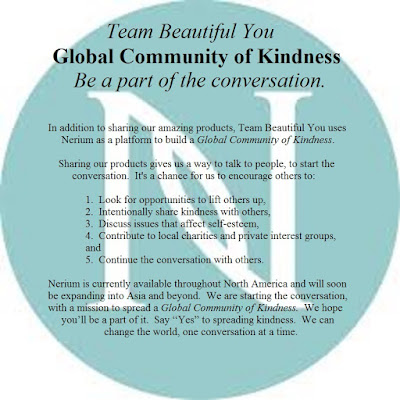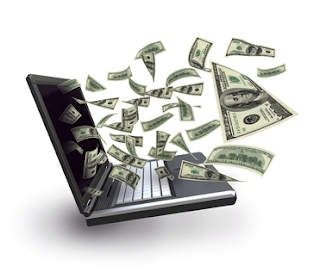Wait, what? How can a penny spent be a penny earned? Well, it really depends what you're spending your pennies on.
As a consumer, you're purchasing things every day. Some of these things are consumable (food, water, etc.). Once you use them, they're gone. You've got nothing in your hand.
Other things are tangible assets, having a physical existence, such as
cash,
personal property, and
real estate. If you can hold it or look at it, it's a tangible asset. When you spend your money on these things, a penny spent is potentially a penny earned.
1) Cash
Most people feel they don't have any "extra cash," but can find some if they really need it. You never know when you'll "need" it, so why not start investing now to make more with the money you do have? You can use cash to invest in a variety of things, with different levels of risk: mutual funds, CDs, stocks, bonds, annuities, etc.
However, have you considered investing your
cash in yourself?
Business has changed since social media has arrived on the scene. Businesses have to change their focus and concentrate on building relationships with people in order to empower their brand and build lasting relationships that will result in long term profits. Thus, the age of
Relationship Marketing is here.
In relationship marketing, you become your brand. Relationship marketing involves using multiple medias to communicate with your customer, including:
– Social Media;
– Blogs;
– E-mail Marketing; and
– Offline Marketing.
Relationship Marketing is an investment in yourself, in your own potential. It's also a great way to
diversify your income. Rather than solely depending on someone else for your income, you create another stream of income. What if your business closes? What if you're laid off? There are countless reasons that solely depending upon another for income is risky business. By investing in yourself, you're creating a source of income that depends on YOU. You determine how much time to put in. You determine your effort. You determine your success.
If you're thinking of investing in yourself through relationship marketing, be sure to research the company and products/services. Make sure you're getting involved in a legitimate business, with a strong infrastructure, great leadership, products you believe in, and an emphasis on personal development.
I've found all of these in
Nerium International, but that does not discount the many other strong relationship marketing companies out there. Do your research, don't rush into anything, and find a company that is a good fit for your family and your life.
2) Personal Property
Oh, goodness. I could write for days about how to make money from your
personal property. For today, I'm going to break it down quite simply. Examine everything in your home. (I suggest a room a day.) Ask yourself:
- Do I use this?
- Do I wear this?
- Do I need this?
- Does it bring me joy?
If you don't use it, wear it, need it, or derive joy from it, it's expendable. Don't just throw it out, make money from it. Look at each item and separate by very valuable items ($500+), valuable items ($50+), or inexpensive items (under $50).
Try to sell very valuable and valuable items online. I've done most of my recent selling on
Facebook - Buy, Sell, Trade pages. You can find these by area. If it's worth it for you to ship it, maybe expand your posting area. The best part is, it's free to post on these pages, but be specific how you want to be paid. Make sure you get cash, money order, or certified check. Make sure the money order or certified check clears before you mail or transfer any property.
Although I haven't used
Craigslist recently, I have bought and sold items on Craigslist in the past. I prefer Facebook because I can see a name and face of the person I'm dealing with. It's more comfortable to me. The downside is potential buyers are limited to the people in the Buy, Sale, Trade group. So, if you want to have a greater number of potential buyers, I'd try Craigslist. It's also free to sell there. As with Facebook, be specific how you want to get paid, making sure the money order or certified check clears before you transfer any property.
Lastly, you can sell on
E-bay,
Shopify,
Etsy,
Gazelle, etc. There are fees associated with these sites, but you typically receive the payment through a 3rd party (such as
PayPal), so it's less likely that you will get ripped off when it comes to payment. You also mail everything. So, it's a safer option if you don't want to meet people in person or have a stranger come to your door.
Your best bet to unload property fast is to post your items in multiple places. If you're posting in more than one Facebook group, indicate this by including "cross-posted" in the item's description.
Now, for the inexpensive items, I'd suggest a yard sell (little or no expense) or even a weekend booth at a flea market (small expense). When I worked for the YMCA, we did a fundraiser where people donated their items, and we rented a flea market space one Saturday to sell it all. It was great because there are so many potential buyers in one spot. We didn't have any tables. We just opened up the back of the van and laid items on the ground. We sold just about everything too!
Another thing I do, especially with children's clothing, toys, and décor, is
consignment sales. I've sold things to consignment shops and also do the weekend church consignment sales. It takes a little time to organize and tag items, and the church does take a small percentage, but it's worth it. A lot of people shop at church consignment sales, and you don't have to be physically present during the sale. Plus, the fee to consign and the percentage the church keeps are
tax deductible.
This article is a good reference to learn more about selling your unwanted/un-needed items:
http://www.wisebread.com/clear-out-that-clutter-15-places-to-sell-your-stuff.
When you've tried to sell everything and still have items remaining, it's now time to donate. Donations to
charitable organizations are
tax deductible. Although you won't have the cash in hand today, you'll get a greater tax refund by donating. You can give up to $499 of "in kind" (non-cash) donations at a time without needing proof of the value of the item/items. Make sure you give to a qualified organization and keep the receipt, including a detailed list of what was donated. For items valued $500 or more, you will need evidence of how you established the item's fair market value.
For specific rules regarding
Tax Deductible Contributions, visit:
https://www.irs.gov/publications/p526/ar02.html#en_US_2014_publink1000229703.
3) Real Estate
Real Estate is not really my forte. Don't get me wrong, I've made a bit of money from real estate, but I don't have a real estate license and would definitely not consider myself an expert. I've read a few books on the topic, but nothing stands out worth recommending. If you need advice or a real estate expert, send me an e-mail. I can try to find someone in your area. I have several friends around the country who may be able to assist you.
The one thing I will say is owning your home (provided you live within your means and have a mortgage commensurate with your income) is preferable to renting. Renting is flushing money down the toilet. Owning your home is the biggest investment most people will ever make. Instead of throwing your money away to rent, invest in your own home and (if you make wise choices) you will profit in the long term.
--------------------------------------------------------------------------------------------------------------------------
BONUS TIP - Credit Cards - A way to make money by spending it.
BE AWARE - I only want you to do this if you have the self-control to not spend more than you earn and can pay your credit card in full every month. I don't want you to increase your debt by using a credit card. If you keep track of your spending and stay within budget, a credit card is a tool to make money.
I've mentioned using credit cards to improve your credit score before, but did you know you can make money by spending money with a credit card? It's true. There are many types of credit cards. Some are free, some have fees, most have points and/or cash back programs.
To get the most from your credit card, call credit card companies and ask where you can find details for their different cards. (Many times, you can find this on the company website.) You'll want to know:
- Is there an annual fee?
- What is the interest rate?
- What are the benefits (points, cash back, travel rewards, etc.)?
Avoid any card with an annual fee.* Why should you pay to spend your own money?
The goal is to pay in full every month. However, just incase you have a month where you can't quite pay in full, you'll want the lowest possible interest rate. Fees and interest are how credit card companies make their money. They're also how people get into credit card debt.
Choose a card where you can get the most cash back. Some will give you 1 point for certain purchases but up to 5 points for others. Choose the card that gives the most points/cash back annually.
Each November, call your credit card company and find out how many points you have and how much cash back is available to you. Most give you the option of putting the cash toward your next account statement or getting a check in the mail. I love doing this just in time for Christmas shopping. I use one credit card for most of my spending and always pay the statement in full. I just called to get my annual cash back, and it's over $1,000!
I made over $1,000 just by spending my own money.
*Cards with Fees - I wanted to add a footnote about cards with fees. There are some benefits of getting a card with an annual fee. If you
travel internationally, there are foreign currency transaction fees. However, certain cards, such as Chase Visa Sapphire Preferred, don't have foreign currency transaction fees. If you're spending money abroad, you're going to save quite a bit using this type of card. There is an annual fee, but you can ask to have the fee waived your first year.
Some cards with fees give you more points, more travel rewards, concierge services, etc. If you use these services enough to see the value in paying the annual fee, go for it. I just don't think the average person utilizes these benefits enough to justify paying an annual credit card fee.









































